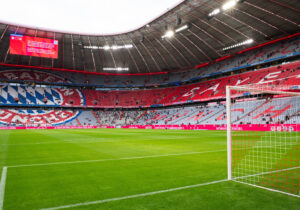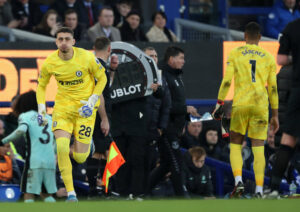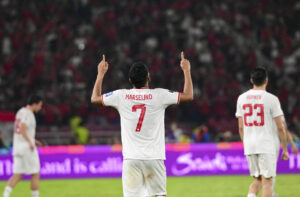With Manchester City and Borussia Dortmund due to face each other in the Champions League quarter-finals, we have taken a look back at the first encounter between the two sides.
Manchester City and Borussia Dortmund: 2012/13
A Different Time for Manchester City and Borussia Dortmund
Things in football were different when Manchester City and Borussia Dortmund met in early October of 2012. This game, on Matchday Two, was the first official meeting between both clubs. VAR was non-existent in the sport, Sky was still Britain’s Champions League source, and Pep Guardiola was in New York.
Group D was seen as something of a ‘Group of Death’ in the Champions League that year. More appropriately, it was a group of champions. Manchester City (England), Dortmund (Germany), Real Madrid (Spain), and Ajax (Netherlands) were all pitted together. It was only City’s second season in the competition, after falling out of the group stage the previous campaign.
Both Manchester City and Dortmund were knocked out of the competition after six games in 2011. City lost out to Napoli and Bayern Munich, while Dortmund only won one game to finish bottom of their group. Dortmund went into this game at the Etihad on the back of a late win against Ajax on Matchday One. Manchester City, meanwhile, had thrown away a late lead at Real Madrid to lose 3-2.
Tactical Approach
Borussia Dortmund and their style under manager Jurgen Klopp wasn’t a secret. The eternal Gegenpress was the plan, which Klopp once acknowledged as the team’s ‘number 10’. So, it was no surprise that Mario Gotze, Dortmund’s actual number 10, was deployed on the wing and with license to roam. Jakub Blaszczykowski, meanwhile, dropped from his natural wing position into the middle to cull City’s midfield.
Manchester City, under Roberto Mancini, had a knack for intricate passing and narrow attacking build-up. But City had started the season sluggishly, looked off the pace, and hadn’t kept a clean sheet all season at that point. Klopp’s midfield worked as Man City’s middlemen were stifled. The narrow build-up play didn’t work, and neither did going direct to Edin Dzeko whenever City took that option. Midway through the first half, City had double the passes Dortmund had but were the less threatening team.
First Half: A Tale of Goalkeepers
Much of the first half felt like personal battles at both ends of the pitch. At one end, it was Mario Gotze against City goalkeeper Joe Hart. The England goalkeeper foiled Gotze on three occasions. Two of those times, he also needed help from the woodwork. At the other end, Sergio Aguero found Dortmund goalkeeper Roman Weidenfeller tough to deal with as he was also denied three times.
Hart also had to deny future Manchester City midfielder Ilkay Gundogan, while Weidenfeller also saved from Samir Nasri. The big chance was arguably from David Silva, who missed a virtually open goal, albeit with a shot from his weaker foot.
Second Half: Lewandowski Lets Manchester City Off the Hook
City had to wait for Yaya Toure to come out for the second half before play resumed. On the pitch, they also seemed to be waiting, with Toure having been subdued. City were also being overrun on the left, with Gael Clichy being isolated and getting done. Mancini sought to remedy that by taking off Nasri and bringing on Aleksandar Kolarov. This meant Clichy dropping into a back-three, but it didn’t curtail Dortmund. Instead, City got even more outplayed.
Up until the hour mark, Marco Reus had been anonymous on the pitch for Dortmund. The new Dortmund signing in the summer had scored five goals in nine games but was slacking here. Passes went astray. Attacking moves were breaking down on his end. But Reus sprung to life on 61 minutes, when he caught a bad pass from Jack Rodwell, and ran through the heart of City’s defence, and Hart was finally beaten.
Dortmund had gotten a deserved lead, as City had barely troubled them throughout the second period. It should have been two and game over ten minutes later, as Ilkay Gundogan sent a sweeping pass into City’s penalty area. It felt to Robert Lewandowski, the one man guaranteed to score goals, but the Polish striker somehow put his effort wide.
City were let off the hook and made amends at the other end when Dortmund defender Neven Subotic handled an Aguero effort in the box on 88 minutes. Substitute Mario Balotelli stepped up and continued his then impeccable record from the spot. Lewandowski had a chance to win it afterwards, but Hart would save City again.
What Happened Afterwards?
It finished 1-1 at the Etihad, and Dortmund maintained their unbeaten start to the Champions League. The German champions would remain unbeaten throughout the group stage to finish top of the group. Dortmund made their way to a first Champions League final in 17 years but lost to German rivals Bayern Munich at Wembley.
Manchester City, meanwhile, didn’t win a single group game, and finished bottom with three points, having fallen behind in every game. City also relinquished their domestic title to rivals Manchester United, finishing 11 points behind in second place. They also lost the FA Cup final to Wigan Athletic, which cost Roberto Mancini his job.
Main Photo






